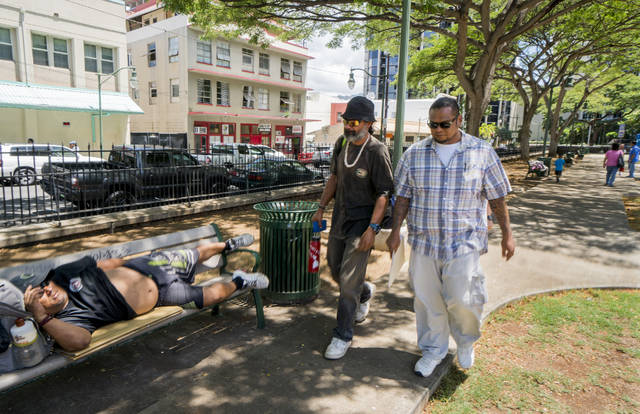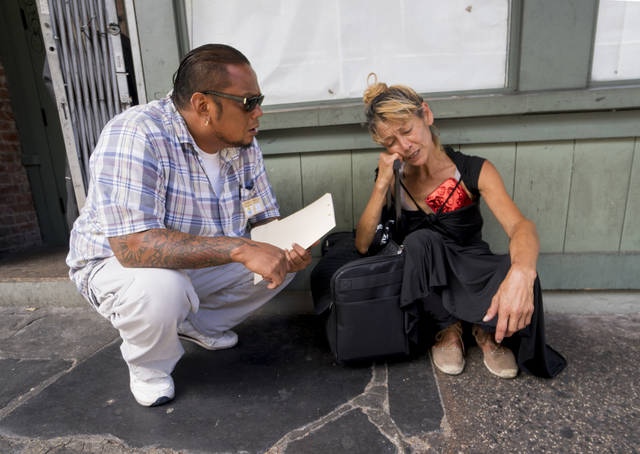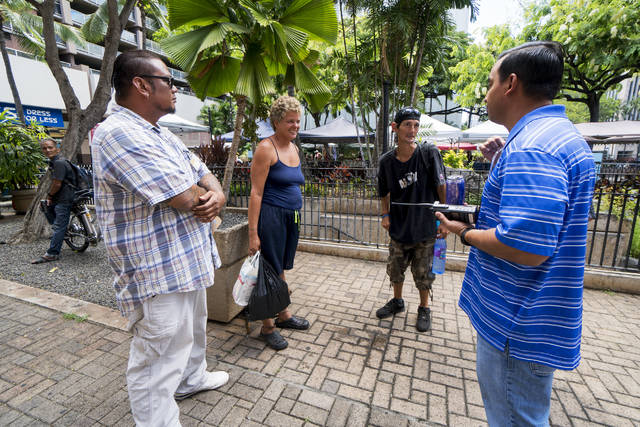Social service workers and police join forces to aid homeless

DENNIS ODA / DODA@STARADVERTISER.COM
Joseph Acosta, right, of ALEA Bridge, a nonprofit group that helps the homeless, talked with a man named Kawika at SmithBeretania Park in Chinatown on Friday.

DENNIS ODA / DODA@STARADVERTISER.COM
Joseph Acosta of ALEA Bridge, a nonprofit that helps the homeless, talked with a woman Friday in Chinatown. She declined Acosta’s offer of help.

DENNIS ODA / DODA@STARADVERTISER.COM
Joseph Acosta and Honolulu police Lt. Mike Lambert, right, talked with Linda Morrissey and Bruce Hershey, who were previously helped off the streets and into a shelter



As they have once a month since May, Honolulu police officers in street clothes joined with social service outreach workers Friday to try a different approach to helping the homeless get off the streets of Chinatown in a pilot program that’s likely to spread to other parts of Oahu.
The idea is to share information that outreach workers already have on individual homeless people so that police officers who encounter them will know which social service agencies are working with them, what problems they face and how best to get them help, including the possibility of a shelter bed and even long-term housing.
So far, six people in the downtown/Chinatown area who have been contacted by the teams of social workers and police officers have agreed to take a ride in an HPD patrol car to get off the street and into a shelter, said Lt. Mike Lambert, who is coordinating the approach called H.E.L.P. Honolulu.
“We don’t normally do that,” Lambert said of the police rides to homeless shelters.
But police and social workers want to get homeless people off the street as soon as they’re ready, instead of having to wait to get a voucher approved in order to call a taxi to take someone to a shelter.
H.E.L.P. Honolulu stands for “Health, Efficiency, Long-term Partnerships.” And Lambert wore a “H.E.L.P. Honolulu” badge over his heart that identified him simply as “Mike” as he walked through Chinatown on Friday.
Don't miss out on what's happening!
Stay in touch with breaking news, as it happens, conveniently in your email inbox. It's FREE!
To get homeless people to seek help, “softening our approach is important,” Lambert said. “It’s an aspect that says, ‘The police are here to help you.’ Whatever roadblocks they have, we’re listening.”
As the administrative lieutenant for the police district that includes Chinatown and downtown, Lambert is responsible for handling complaints about homeless people in one of Honolulu’s densest and busiest districts.
“The complaints are, ‘There’s a homeless guy in front of my store. There’s a homeless guy in the park. Do something. Do something. Do something!’” Lambert said.
In March he decided to do something different.
Lambert got in contact with former HPD officer Joseph Acosta, who once had to sleep out of his subsidized police vehicle when he himself became homeless in 2014. Acosta left the department in 2016 to launch a nonprofit organization with his brother, sister and in-laws called ALEA Bridge which is dedicated to helping Oahu’s homeless.
“The law enforcement side is now seeing what the social service side is doing,” Acosta said Friday before fanning out across Chinatown. “Now they can understand the issues and address the larger problems rather than just saying, ‘Move it along.’”
In all, 20 social workers and police officers in four different teams walked throughout Chinatown on Friday.
Lambert already plans to increase the number of times that social workers go out with police officers each month to increase the number of homeless interactions.
At the same time, HPD Capt. Jayson Kauwenaole, who is responsible for District 4, which runs from Waimanalo to Kahuku, already plans to import H.E.L.P. Honolulu to the Windward side.
“Not maybe,” Kauwenaole said. “We will be bringing it to D-4 eventually. … Creating that information sharing between HPD and outreach workers has us all on the same page.”
Beyond the half-dozen homeless people who have already gotten into shelters, just getting social workers to sit down with police officers and compare notes has revealed how easily some gaps can be plugged, Lambert said.
During a briefing about individual homeless people whom they were likely to encounter, someone said that a couple had applied to enter the city’s Hale Mauliola transitional community on Sand Island, which allows animals — a critical factor in getting homeless pet owners off the street.
But Justin Phillips, homeless outreach field manager for the Institute for Human Services, which operates Hale Mauliola for the city, checked on the paperwork and could find only a single application for the woman, Linda Morrissey, but not her partner, Bruce Hershey.
So Phillips got the paperwork straightened out. Then on Friday, Lambert, Acosta, state homeless coordinator Scott Morishige and Morishige’s assistant, Tamah- Lani S.K. Noh, bumped into the couple at Fort Street Mall with their 13-week-old puppy, Brutikus.
They were happy to report that they’d been living in Hale Mauliola since July 14.
Asked how they felt about HPD’s new partnership with social service agencies that got the couple and their dog into housing, Hershey told the Honolulu Star-Advertiser simply, “It’s awesome.”
He and Morrissey now plan to move to San Diego, reducing Oahu’s homeless population by two.
“We can’t afford it here,” Hershey said.
Veteran social workers and police officers know that their offers of assistance will be rejected more than they will be accepted.
Acosta, for instance, spent nearly an hour with a man named Kawika whom Acosta found sleeping on a piece of cardboard on a bench at Smith-Beretania Park at lunchtime Friday.
Acosta was able to get biographical information on Kawika but could not get him to take a ride in an HPD “white car” to check into IHS.
HPD veterans such as Sgt. Deric Valoroso, who has been an officer for 20 years and supervises the community policing team that covers downtown and Chinatown, feels optimistic about H.E.L.P. Honolulu.
Valoroso was involved in the massive sweep of the Kakaako homeless encampment that had swelled to more than 300 people in the summer of 2015. Valoroso said constant visits by police, medical teams, mental health experts and social service workers ended up helping dozens of families and individuals and significantly reduced the number of homeless people in Kakaako.
On Friday, dressed in a black T-shirt, jeans and running shoes, Valoroso said H.E.L.P. Honolulu has the potential to help even more homeless people across the island.
“We dress differently,” he said. “We’re more approachable. Now, instead of telling them, ‘You can’t be here,’ we’re here with (social service) partners. I’m seeing progress already.”





